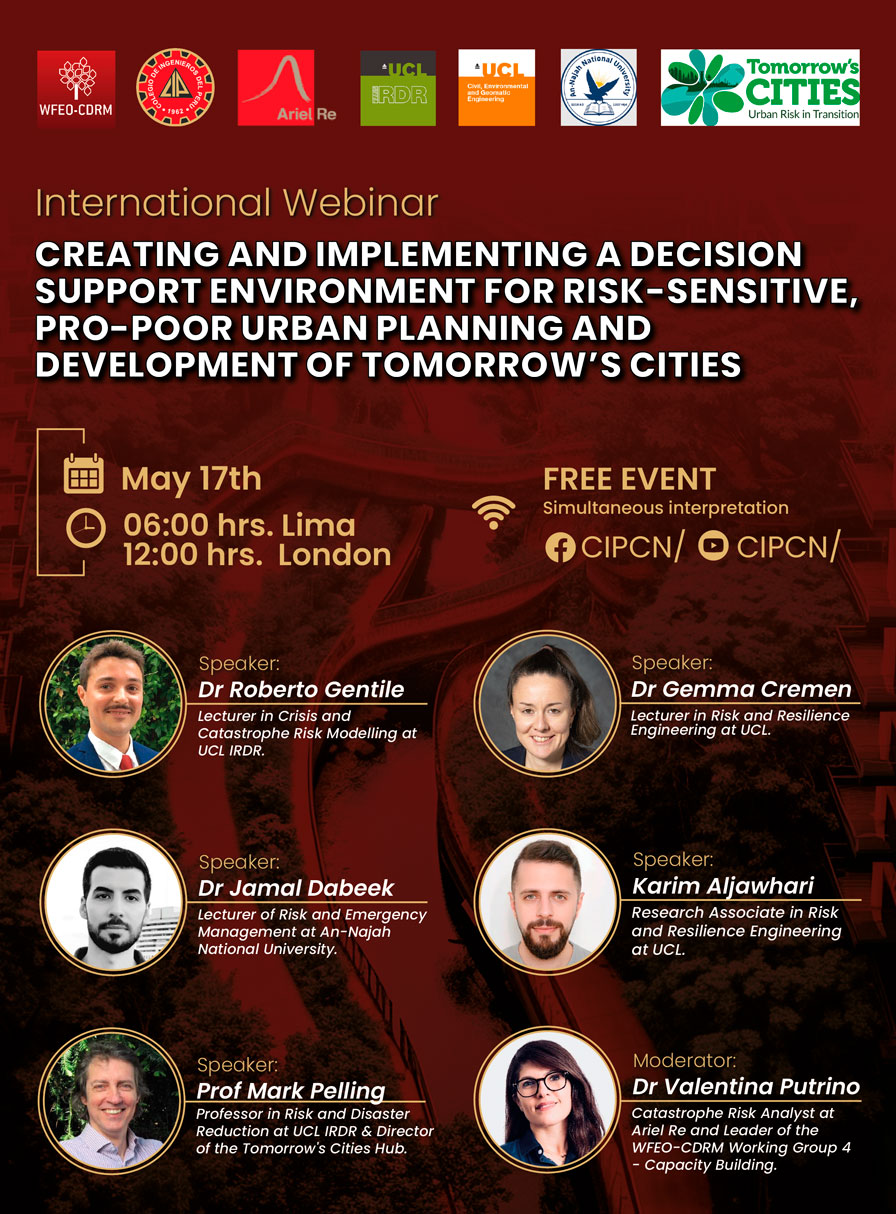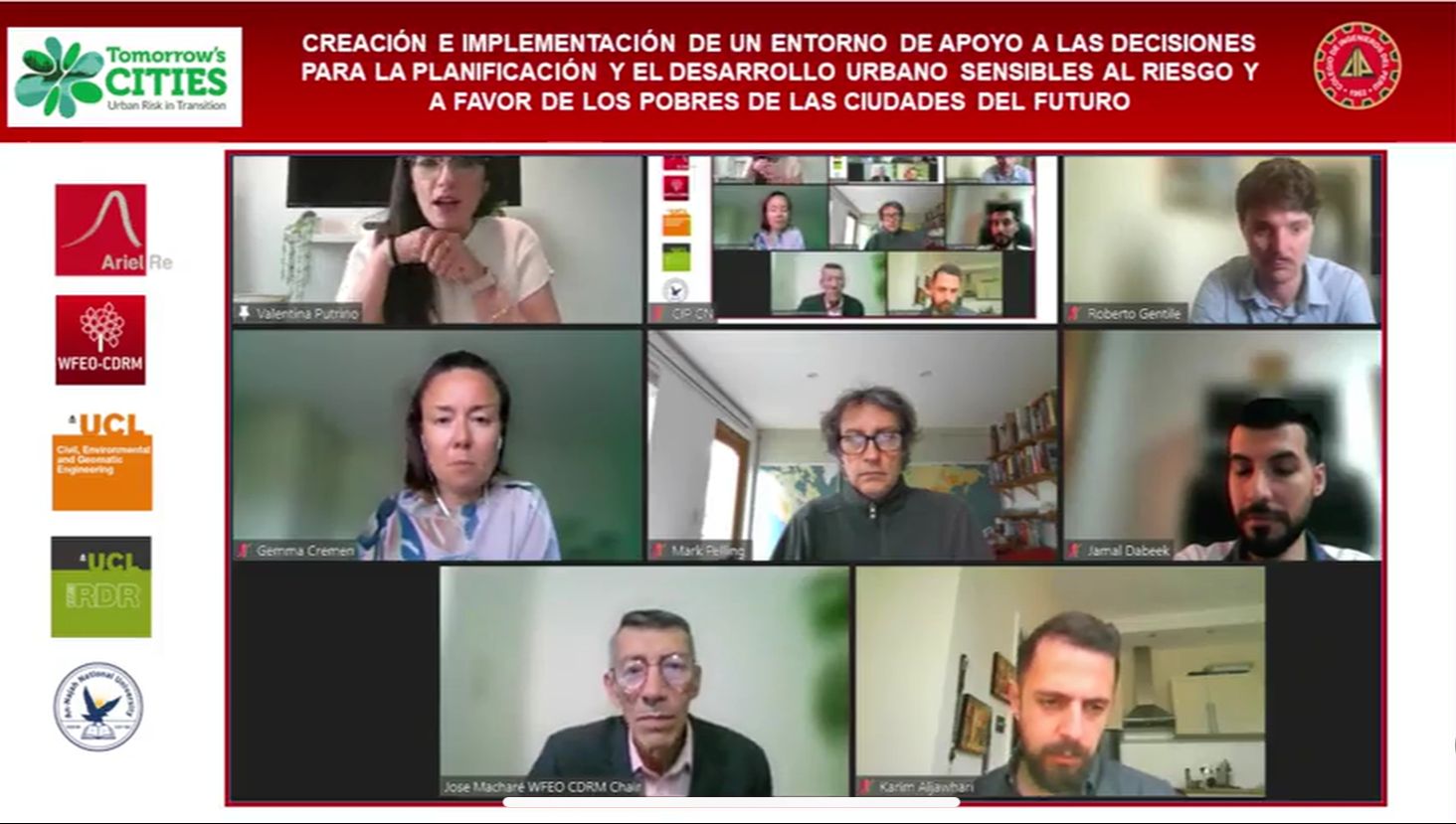
INTERNATIONAL WEBINAR
CREATING AND IMPLEMENTING A DECISION SUPPORT ENVIRONMENT FOR RISK-SENSITIVE, PRO-POOR URBAN PLANNING AND DEVELOPMENT OF TOMORROW’S CITIES
The Technical Committee on Disaster Risk Management of the World Federation of Engineering Organizations (WFEO) and the Peruvian Engineers Association (CIP) are organizing this important event to be held on May 17th, at 06:00 hrs. in Lima and 12:00 hours in London.
This talk will primarily cover the successful deployment of the Tomorrow’s Cities Decision Support Environment (TCDSE) in the city of Nablus, Palestine, a rapidly expanding urban area that lacks formal planning and is increasingly exposed to floods, earthquakes, and landslides. The promising potential of the TCDSE to help minimize future urban risk creation in this context will be highlighted. The webinar will conclude with an open discussion on the general capabilities of the TCDSE to shape policy changes that ultimately lead to risk-informed urban futures.
PROGRAMME
OUR SPEAKERS
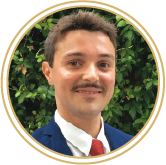 |
Roberto Gentile is a Lecturer in Catastrophe Risk Modelling at the UCL Institute of Risk and Disaster Risk Reduction and co-Director of the DE|RISC Lab (Disaster Engineering for Resilient Societies). His research advances risk modelling, emphasizing on physical vulnerability models, multi-hazard vulnerability, lifecycle loss assessments, combination of hazard insurance and structural retrofit under humanitarian constraints (especially in developing countries). Within Tomorrow’s Cities, he leads the Risk Agreement work package. He co-authored 37+ journal publications and 55+ conference papers. He joined UCL as Research Associate and subsequently as a Marie Curie Senior Research Fellow. He obtained his PhD in Earthquake Engineering in 2018. |
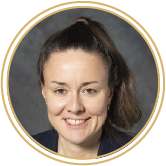 |
Gemma Cremen is Lecturer of Risk and Resilience Engineering within the Department of Civil, Environmental and Geomatic Engineering at UCL, where she is also Co-Director of the DE|RISC (Disaster Engineering for Resilient Societies) Lab. She is the Physical Sciences Technical Co-Lead of the Tomorrow’s Cities Research Hub. Gemma’s research focus is at the intersection of civil engineering and other related disciplines, with the aim of facilitating multi-hazard risk- and resilience-informed decision making for a better tomorrow’s world. She has co-authored over 30 journal publications, including an Editors’ Highlight in Nature Communications. Gemma was previously a (Senior) Research Fellow (in Civil Engineering) and a Research Associate (in Geophysics) at UCL and the University of Bristol, respectively. She completed her PhD in Earthquake Engineering at Stanford University in 2019. |
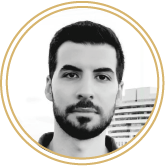 |
Jamal Dabbeek is Lecturer of Risk and Emergency Management at An-Najah University, Palestine. Jamal’s research focuses on probabilistic multi-hazard risk, modelling the built environments using EO and open-data and design of disaster risk transfer strategies. Within Tomorrow’s Cities, He is the lead of Nablus City. He worked at Global Earthquake Model Foundation (GEM) focusing on developing the seismic risk model for the Middle East area and later he worked for the European research center in Earthquake Engineering (Eucentre) focusing on the new European seismic risk model (ESRM20). He completed his PhD in Risk and Emergnecy Managment at IUSS university in 2020. |
 |
Karim Aljawhari is a Research Associate in Risk and Resilience Engineering at the Department of Civil, Environmental and Geomatic Engineering at UCL. He is also a co-lead of the deployment of Tomorrow’s Cities Project in Nablus, Palestine. Karim’s research focuses on enhancing the disaster resilience of earthquake-prone communities through multi-criteria optimal design and selection of structural rehabilitation strategies, with emphasis on life-cycle sustainability, indirect economic losses, and repair costs, and budget constraints. He is currently finalising his PhD studies in Earthquake Engineering and Seismology at the University of Pavia (UniPV) and the University School for Advanced Studies (IUSS) Pavia. |
 |
Mark Pelling is Professor of Risk and Disaster Reduction, Institute of Risk and Disaster Reduction, University College London and Director of the Tomorrow’s Cities Research Hub. His research focus is on the social and institutional aspects of disaster risk reduction and climate change adaptation, primarily in urban contexts of low- and middle-income countries. He has served the Intergovernmental Panel on Climate Change 5th and 6th Assessment Reports as a Lead Coordinating Author heading urban impact and adaptation chapters and is the UK representative for the European Science and Technology Advisory Group to UNDRR. |
OUR MODERATOR
 |
Valentina Putrino is currently a Catastrophe Risk Analyst at Ariel Re. She obtained her PhD from University College London (UCL), focusing on developing a framework for multi-hazard assessment of historic stonework structures. She currently holds the position of Chair of the EEFIT Committee, she is the SECED Representative for the World Federation of Engineering Organizations (WFEO) – Committee on Disaster Risk Management (CDRM), and is also the designated liaison member between both SECED and EEFIT committees. |
